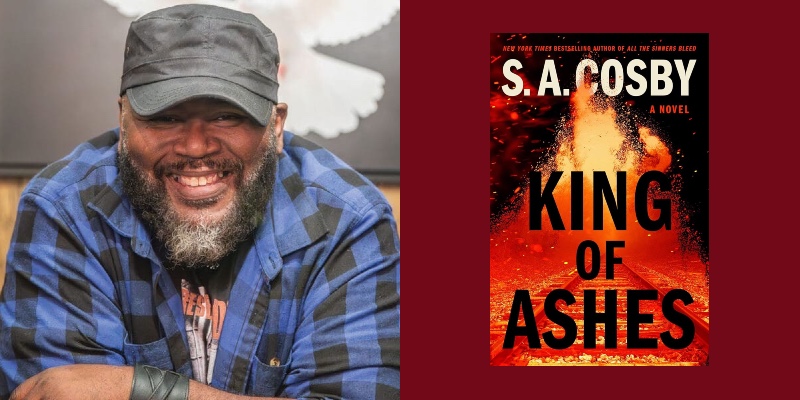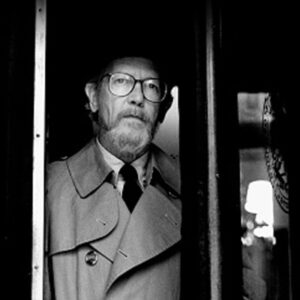Earlier this year, crime fiction author S.A. Cosby wrote in The New York Times that “every crime and mystery writer has four types of novels they will inevitably write in their career: a murder mystery, a heist novel, a novel of revenge—and a serial killer novel.”
Cosby’s initial trio of novels hit three of those themes: “Blacktop Wasteland” was a saga of fierce heists and high-speed getaways, while “Razorblade Tears” followed two fathers on a mission of righteous revenge, and “All the Sinners Bleed” tracked a serial killer against a background of small-town racial strife. Given that, you might be tempted to think that his latest novel, “King of Ashes,” would attempt to complete the circuit with a murder-mystery plotline—but while the novel has a decades-old mystery at its core, it’s much more of a family saga.
“I think, for me, ‘King of Ashes’ scratches a personal itch, which is the crime epic, a la ‘Goodfellas’ or ‘The Godfather’ or ‘Menace II Society,’” Cosby says. “For me, the crime epic shows how a community—oftentimes an economically vulnerable community—is both affected by and can collapse under the influence of a criminal entity, just as much as the people involved in that criminal entity.”
“King of Ashes” starts with Roman Carruthers, the scion of a Virginia family that owns a crematorium, returning home after his father is knocked into a coma after a car accident. Roman is a wealth manager, a job with skills that don’t help him much at all as he tries to support his brother Dante, who’s in debt to some very dangerous people, and his sister Neveah, who’s barely holding the family business together.
Much of the book’s action takes place in the fictional town of Jefferson Run, a gritty husk of an industrial powerhouse. Cosby is evocative in his descriptions of abandoned buildings, cracked roads and seedy businesses, and many of the secondary characters are products of that environment: desperate, tough, and vicious when they need to be.
After his initial stumbles, Roman quickly learns the new rules of his old home, and then he begins making moves that put him toe-to-toe with the worst people around him. His enemies might initially dismiss him as a glorified accountant, but Roman is something much more—and he’s willing to shed a lot of blood to prove it. Soon, he’s gaining power in the underworld he initially feared.
Cosby has long been fascinated by characters who are good at being bad, particularly gang leaders and mob bosses—think of Michael Corleone in “The Godfather,” or Frank Lucas as portrayed in Ridley Scott’s “American Gangster.” But he also wanted to show a character like that in all their dimensions: “Often mob bosses like Thomas Shelby from ‘Peaky Blinders’ are shown to be smart and ruthless,” he says, “but I wanted to see what they are like at home when they aren’t planning murders, and how their skills affected the rest of their lives.”
In that spirit, Cosby takes pains to demonstrate Roman’s vulnerability, and how his past traumas impact everything from his relations with his siblings to his sexuality. All of that helps color the audience’s reaction to the terrible things Roman does as the story gains momentum. “When you are attempting to illustrate the tragic hero and their fall from grace, you have to establish the good parts, the sympathetic parts of their character,” Cosby says. “You have to make those aspects real so that the fall, when it comes, hurts. It hurts the character and the readers. And through that pain you find a hard-won understanding of how much they have lost.”
“King of Ashes” is part of a newish trend in family crime epics—over the past few years, we’ve had Don Winslow’s Danny Ryan trilogy, which draws from Greek myth as it follows a Rhode Island gang’s collapse and revival through the 1980s and 90s. There’s also Jordan Harper’s “Last King of California,” a multi-generational saga about a California biker gang, and William Boyle’s “Saint of Narrows Street,” which touches on similar traumas and crimes that live at the heart of Cosby’s book. (To butcher Tolstoy: all families with legitimate pursuits are alike; each criminal family collapses in its own way.)
But “King of Ashes” stands apart in how it captures in microcosm our current moment as a country. Like many rural and semi-rural communities across the country, Jefferson Run has its best days in the rearview mirror—and nothing will likely revive its fortunes. The Carruthers Crematorium is one of the few viable local businesses, if only because there are always dead bodies in need of burning. As legitimate systems collapse, people inevitably get rich engaging in what might be euphemistically referred to as the “alternative economy”: crime, money laundering via cryptocurrency, and so on. You might not like everything Roman does, but he often doesn’t have a real choice given everything happening around him; this is simply how you prosper in America.
Thematically, “King of Ashes” also lines up well with Cosby’s other books, all of which focused a light on everything in America that’s setting us at each other’s throats. “All the Sinners Bleed” came out just as the national conversations over school shootings, the removal of Confederate monuments, and policing (all of which are wrapped into the narrative) seemed to become particularly superheated. “Razorblade Tears” used its main characters’ revenge quest as an entryway to explore bigotry and forgiveness. With “Ashes,” the malaise is more general, a sense that everything around the edges is imploding—and it’s bad enough to turn even the most well-meaning person into a monster.

















